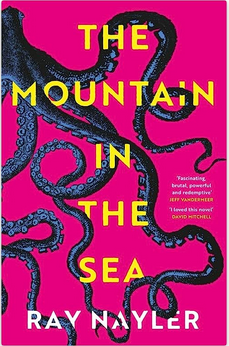
This is the best science fiction book I’ve read this year. It’s bleak and it shines an unflattering light on humanity, but it’s thought provoking and extremely well-written. So often in science fiction difficulties of communication between alien races are brushed over or the “universal translator” makes another appearance. But, how hard would it be really, to communicate with an alien species? What if their senses and medium of expression were different from humanity? Children of Time, by Adrian Tchaikovsky gets somewhat close - the Spiders don’t imagine that vibrations in air would be a way to communicate, but in this case there is a ready-made intermediary. Blindsight, by Peter Watts does an excellent job (although he’s more interested in whether consciousness is an advantage or disadvantage) - what if the very act of communication was perceived as an aggressive act? The Mountain in the Sea is closer to home though, and the aliens are already here.
The world described in The Mountain in the Sea is a bit further along the path of climate change and loss of biodiversity than ours but is still very recognisable. One of the things that made the book so enjoyable for me was the richness of the world building and the other themes in the book explored by parallel but interconnected narratives. As well as the main narrative concerning how could we manage to communicate with intelligent octopuses, there is modern day slavery, how would humanity react to genuinely intelligent AI and whether AI systems would give rise to a new breed of AI hackers.
There are many questions that the book poses to us via the narrative, such as:
- If we had the choice of a partner equal to us (another human) or one that gave us almost everything we wanted but had no needs of its own, what would we choose?
- In a world of widespread robotics and automation, would slavery still be a thing. Are humans cheaper to run than robots?
- Can AIs go insane? Can they feel rage or show mercy?
- How would widespread AI change the nature of hacking?
There is so much depth to this book, but I don’t want to spoil the story. If you read one science fiction book this year, read this one.
I’d also strongly recommend Children of Time, by Adrian Tchaikovsky and Blindsight, by Peter Watts.